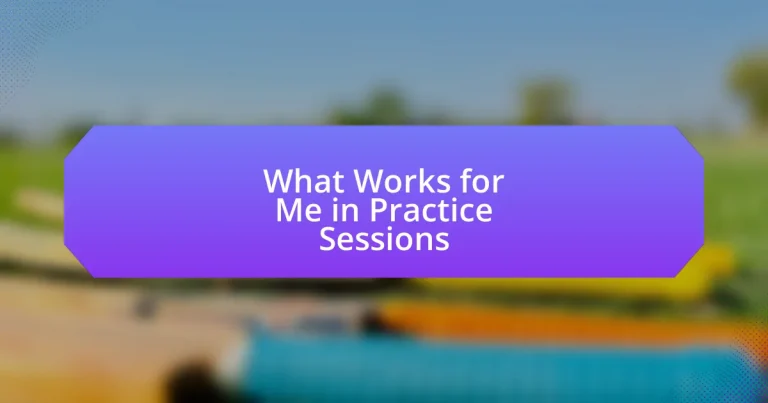Key takeaways:
- Creating an organized and supportive practice environment enhances focus, motivation, and accountability.
- Setting realistic, achievable goals prevents burnout and maintains steady progress.
- Incorporating feedback and reflection transforms mistakes into learning opportunities and deepens engagement with the material.
- Varying practice routines and tracking progress can rejuvenate motivation and reveal improvements in skill development.
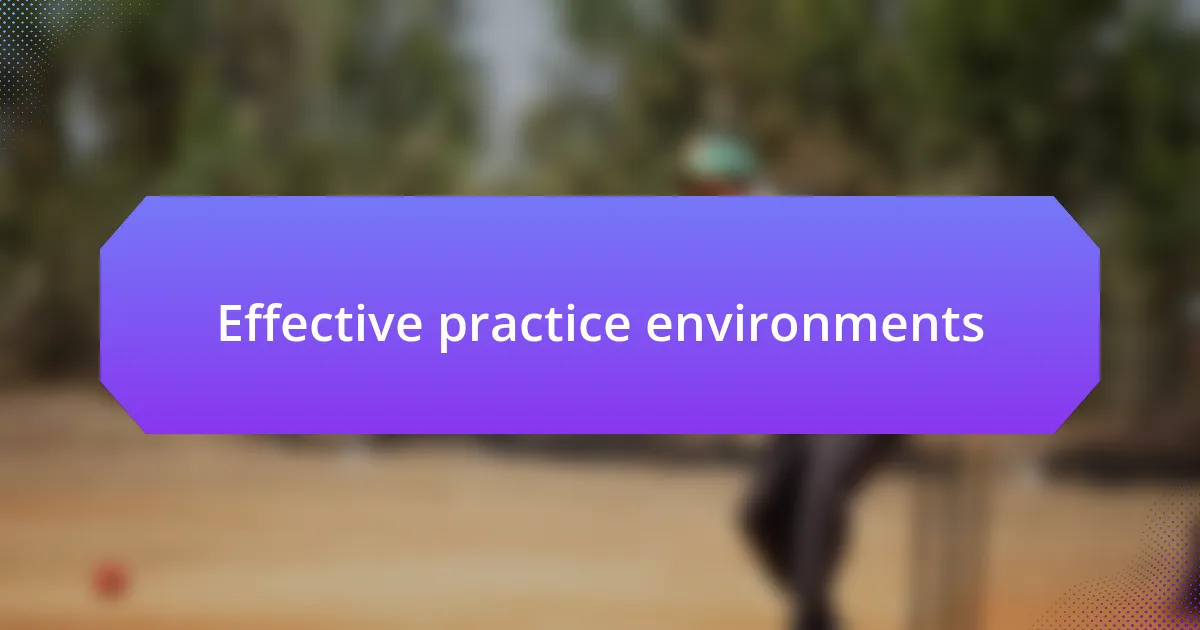
Effective practice environments
Creating effective practice environments is essential for maximizing growth and achieving goals. There was a time when I practiced in a cluttered space filled with distractions. I noticed that each time I struggled to focus, my progress faltered. Have you ever considered how your surroundings impact your performance? A clean, organized space can work wonders, allowing clarity to emerge and creativity to flow.
I’ve also found that the ambiance of a practice space greatly influences my mood and motivation. For example, when I switched to a quieter room with soft lighting, I felt calmer and more focused. Have you ever experienced a shift in your energy just by changing your environment? It’s fascinating how a few simple adjustments can foster a more productive mindset.
Additionally, surrounding myself with supportive peers enhances my practice sessions significantly. I remember practicing alongside friends who were equally passionate, and the energy was electric. It creates a sense of camaraderie and accountability. Isn’t it amazing how a shared commitment can elevate everyone involved? Engaging with others who share your goals not only motivates but also cultivates a rich learning atmosphere.
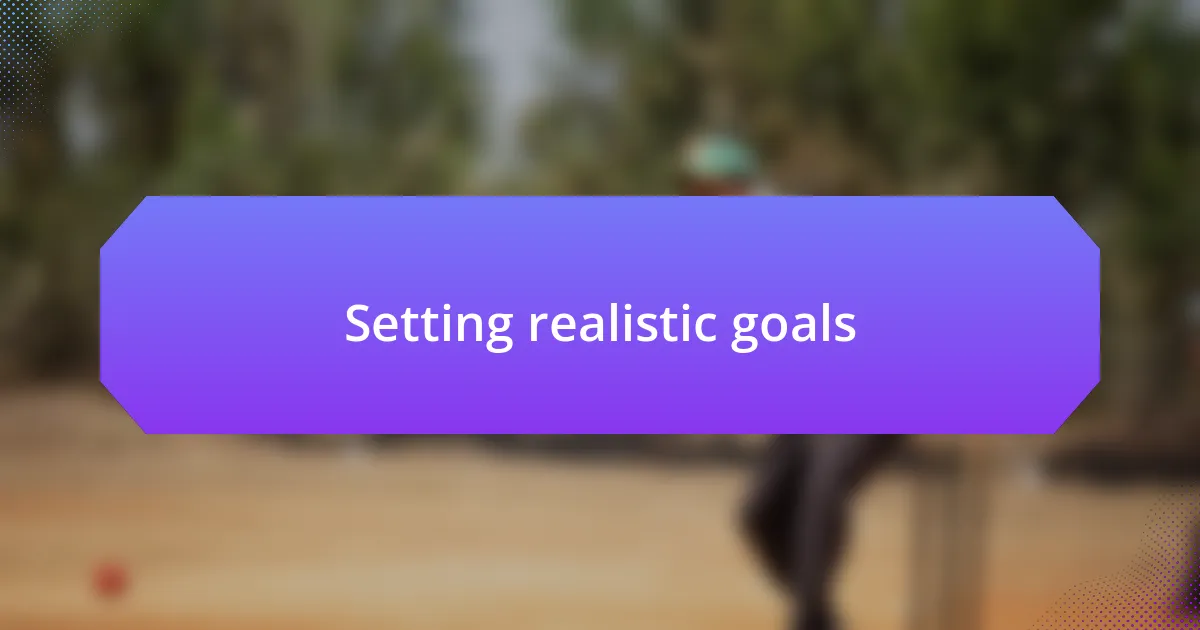
Setting realistic goals
Setting realistic goals is crucial for maintaining motivation and tracking progress. In my experience, I often set ambitious targets that seemed inspiring at first, but over time, they felt overwhelming. I remember a time I aimed to double my practice hours within a month; it led to burnout instead of growth. Smaller, achievable milestones could have kept my spirits high and my pace steady.
Here’s what I’ve found helpful when setting realistic goals:
- Break down larger objectives into smaller, manageable tasks.
- Set specific time frames—like weekly or monthly goals—to help you maintain focus.
- Celebrate small victories to keep motivation alive and recognize your progress.
- Regularly reassess goals based on your evolving skills and circumstances.
- Understand your limits; it’s okay to adjust goals to create a more sustainable practice routine.

Using deliberate practice techniques
Using deliberate practice techniques is about focusing your efforts to push beyond your comfort zone. I’ve found that dedicating specific time to tackle one aspect of my skill can yield significant improvements. For instance, when I concentrated solely on mastering a challenging chord progression in guitar, I noticed enhanced fluidity that I hadn’t achieved in previous sessions when I divided my focus.
Another effective technique I’ve embraced is seeking immediate feedback while practicing. There was a time I recorded my sessions and listened back to them. Hearing my mistakes allowed me to correct them right away, making the practice feel much more rewarding. This immediacy transforms practice from a mechanical routine into an engaging learning experience.
Additionally, I’ve come to appreciate the importance of mental rehearsal. Visualization has played a crucial role in my training. I vividly imagine myself successfully executing complex tasks, which not only builds confidence but also prepares my mind for actual performance. When the moment arrives, I find myself less anxious and more ready to deliver.
| Technique | Description |
|---|---|
| Focused Practice | Concentrate on one specific aspect to improve efficiency. |
| Immediate Feedback | Use recordings or coaching for quick adjustments. |
| Mental Rehearsal | Visualize success to boost confidence and readiness. |
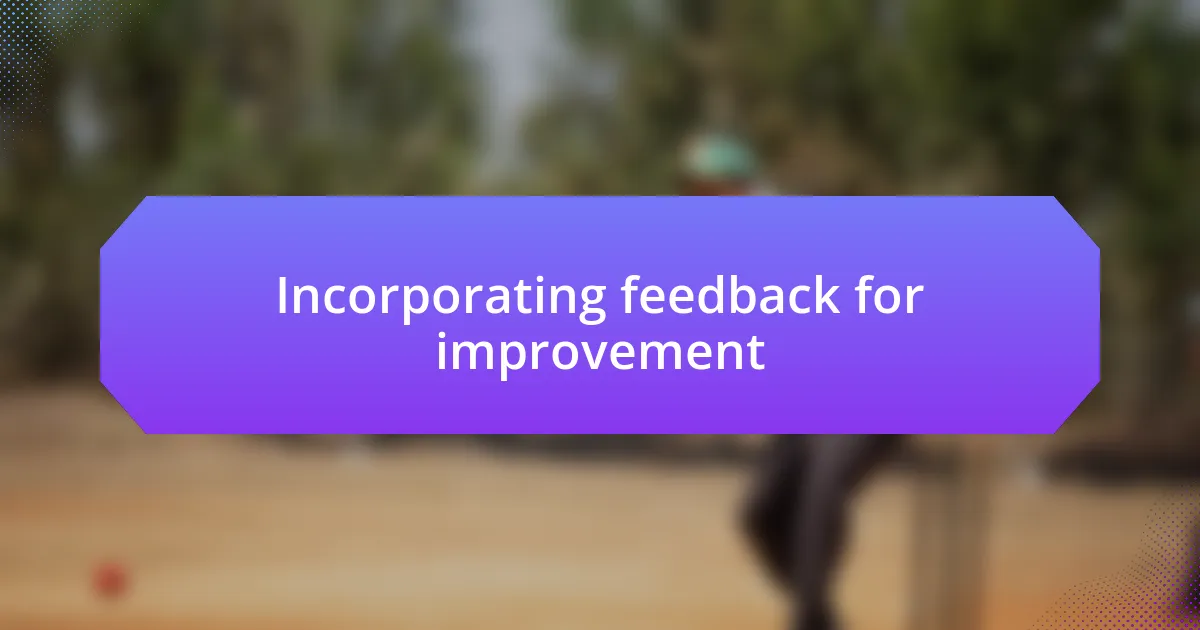
Incorporating feedback for improvement
Feedback can sometimes feel like a double-edged sword. I remember a moment during my practice when a fellow musician pointed out my timing issues. Initially, I felt defensive, but I took a breath and found that his observations opened my eyes to patterns I hadn’t considered. Embracing that feedback not only sharpened my timing but also deepened my appreciation for collaborative growth.
The process of incorporating feedback isn’t just about fixing mistakes; it’s about understanding the why behind those mistakes. I once attended a workshop where an instructor meticulously broke down a common error I made. It was enlightening to hear her explain how that small adjustment could lead to a more polished sound. That experience made me realize that feedback is a powerful tool for deeper learning, turning mistakes into stepping stones for improvement.
After receiving feedback, I always jot down actionable steps to apply in my next session. This practice has transformed my approach significantly. Recently, I focused on a comment about my tone quality; I experimented with different techniques and ended up discovering a unique sound that set my playing apart. Have you ever had a moment where feedback led to a breakthrough? For me, it’s those moments that fuel my passion for continual improvement.
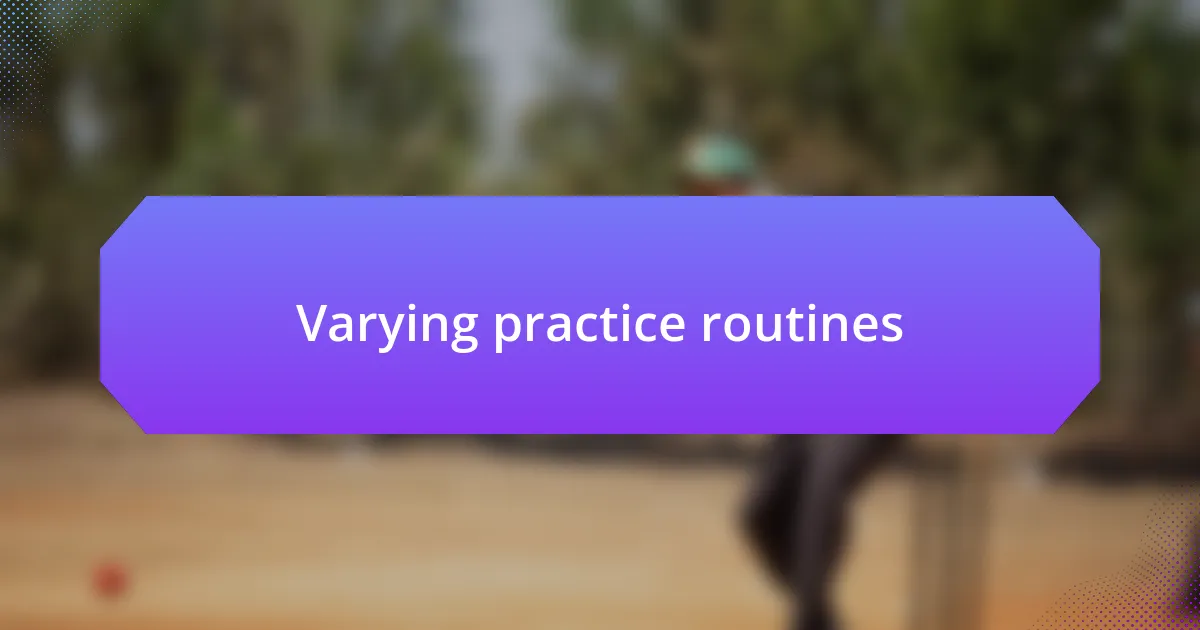
Varying practice routines
Varying practice routines can breathe new life into your sessions. I once noticed that sticking to the same exercises became monotonous, making it difficult to stay motivated. By switching up my routine, whether it was incorporating scales into my warm-ups or playing along with different genres, I felt like I was rediscovering my passion for music. Have you ever felt that spark reignite when trying something new?
One of my most effective methods has been to set themed practice days. For instance, dedicating a day to improvisation pushed me creatively and broke the usual cycle of repetition. I remember feeling liberated the first time I simply let go of strict patterns; it was exhilarating! This approach not only lightened my mood but also enhanced my overall skills. What theme would you choose to experiment with?
It’s fascinating how varying practice routines can also lead to surprising improvements in my performance. When I introduced elements from jazz into my classical training, it shifted my perspective entirely. The spontaneity of jazz allowed me to be more expressive, turning rigid phrases into flowing melodies. This crossover made me ponder: how many other styles could enhance my technique? Each time I explore a new routine, I uncover a deeper layer of my musical identity.
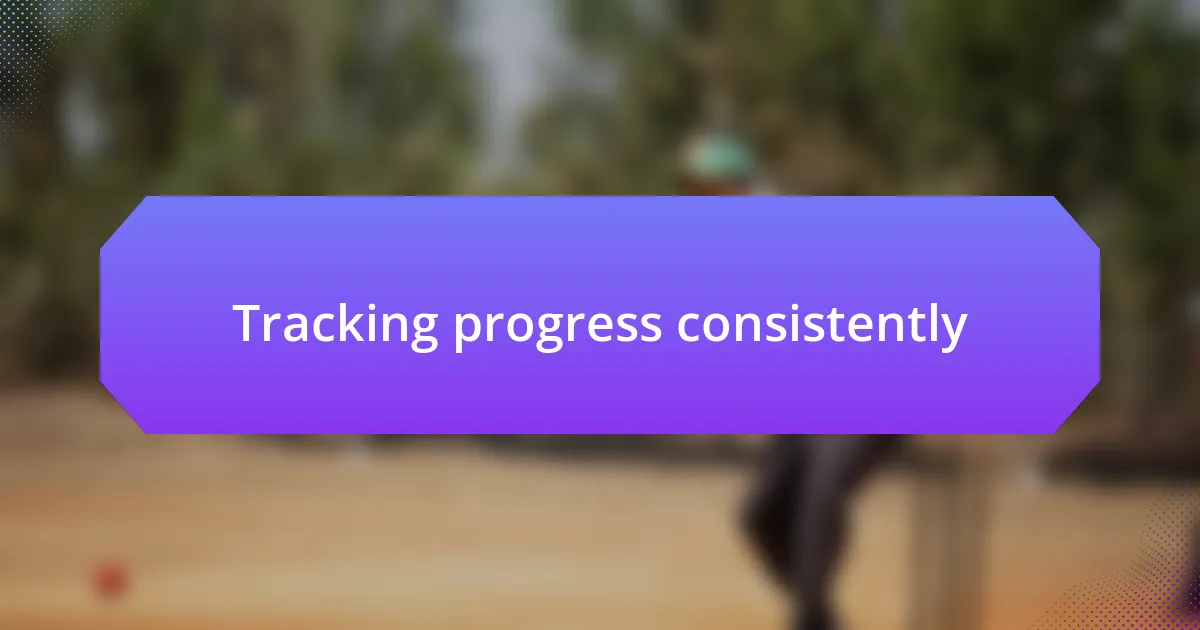
Tracking progress consistently
Tracking progress consistently is essential in any practice session. I remember when I first started documenting my practice times and achievements; it was eye-opening. Those small notes detailed what I worked on, the challenges I faced, and the victories I celebrated, no matter how minor. Hasn’t it ever struck you how satisfying it is to look back and see how far you’ve come?
Another strategy I’ve adopted is using a progress chart. I honestly thought it would feel tedious, but it became rewarding. Marking each week’s improvements, from mastering a tricky passage to simply maintaining focus throughout, filled me with a sense of accomplishment. There’s something motivating about visually charting progress; it’s like creating a roadmap for success. Have you ever found motivation in tangible evidence of your growth?
Lastly, I’ve also integrated self-assessments into my routine. After each session, I reflect on what went well and what needed improvement; this practice gives me clarity. I recall a time when I thought I had mastered a particular song, only to discover new nuances upon reflection. It’s humbling and invigorating. How do you identify the areas you want to work on? For me, these consistent check-ins aren’t just about tracking; they’re about evolving.
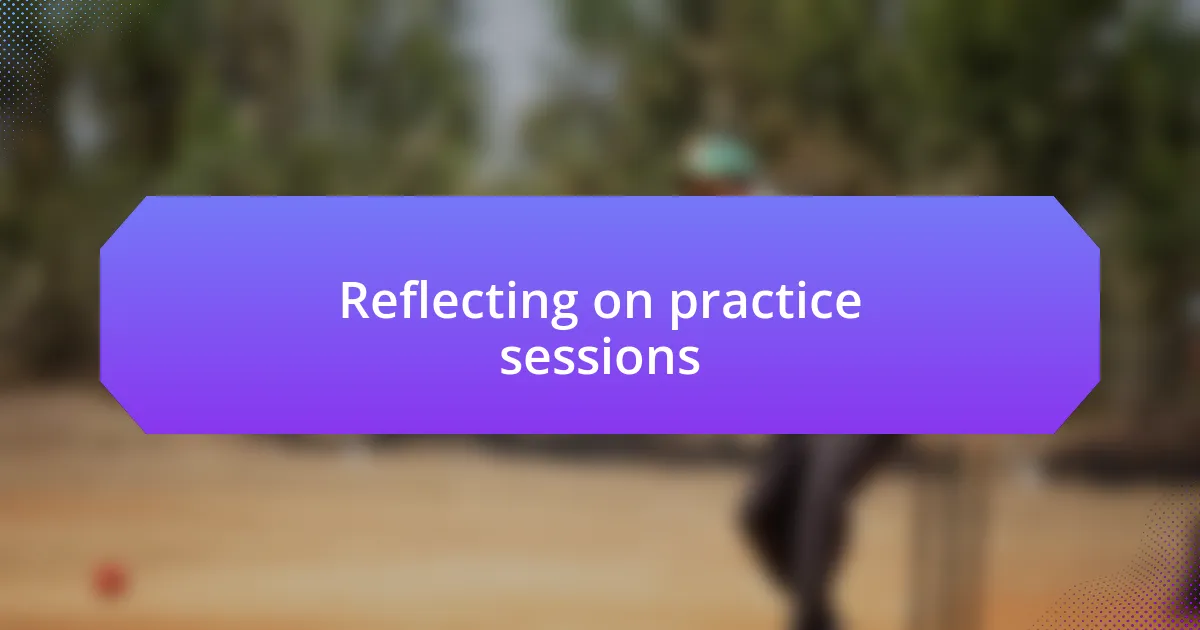
Reflecting on practice sessions
Reflecting on practice sessions has always been a critical step for me. After each session, I take a moment to think about what felt right and what didn’t. I recall a challenging day when I struggled with a specific technique; it was only through reflection that I pinpointed my approach’s flaws. That realization pushed me to try a different method, leading to a breakthrough. Have you experienced a moment like that, where reflection changed your approach entirely?
Sometimes, I find it useful to write down my thoughts right after practicing. It’s amazing how capturing my feelings can reveal insights I might overlook in the heat of the moment. I remember reflecting on a particularly frustrating session when I wrote, “I felt lost,” and that led me to explore why. This practice of journaling creates a dialogue with myself, transforming frustration into opportunity. Do you journal your experiences, or do you prefer to think things over quietly?
Creating a habit of reflective practice not only helps in identifying improvements but also fosters a deeper emotional connection to the material I’m working on. Once, I realized how a simple song I played brought back memories of my childhood, making my practice more enjoyable. This emotional engagement fuels my motivation and reminds me why I started in the first place. How do you connect emotionally with your practice? For me, these reflections deepen not just my skills but my love for the craft.












